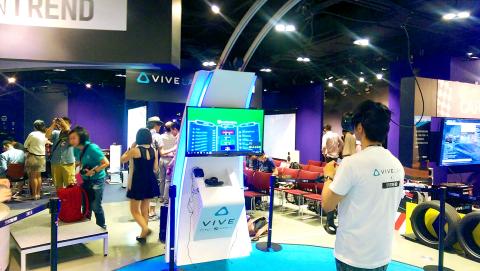HTC Corp (宏達電) and Syntrend Creative Park (三創園區) have jointly invested NT$10 million (US$316,086) in building a virtual reality (VR) arcade in Taipei, that is set to open tomorrow, in an effort to expand HTC’s VR business and attract more consumers to the park.
“Our plan is to establish a new business model and generate NT$2 million in revenue per month at the Viveland in Syntrend,” HTC vice president of virtual reality Raymond Pao (鮑永哲) told a news conference in Taipei.
This is HTC’s first direct investment in a VR theme arcade since the company launched its Vive headsets worldwide in April.

Photo: CNA
The company invested between NT$4 million and NT$5 million, and Syntrend funded the rest for the project, Pao said.
HTC is in talks with large electronics store operators in the US, China and Japan to build similar VR theme parks there, he said.
The ticket prices for different zones and booths within Vivland range from NT$150 to NT$400 for 15 minute to 30 minute sessions.
Viveland could become profitable in one year after its launch, said Syntrend business vice president Ray Wang (王國瑞), who estimated the arcade could attract 500 to 700 consumers per day during weekdays and 1,000 to 1,500 per day on weekends.
Yuanta Securities Investment Consulting Co (元大投顧) said running a VR arcade is a positive strategy for HTC to directly introduce its devices to more consumers.
However, Yuanta analyst Jeff Pu (蒲得宇) said he remains conservative about the sales momentum of HTC Vive this quarter, due to its high price tag and complicated installment.
“We forecast Vive shipments this quarter will only grow slightly from last quarter on seasonal demand during the Christmas holidays,” Pu said by telephone.
Despite the company’s continuous investments in the VR business, smartphones remain a major revenue driver for HTC, accounting for more than 90 percent of the company’s total revenues last quarter, according to Yuanta’s estimates.
Pu said he expects HTC’s smartphone shipments this quarter to decline from last quarter, as HTC’s new models are not competitive enough.
Pu forecast HTC’s revenues could climb 13.2 percent to NT$25.16 billion from last quarter’s NT$22.23 billion, supported by VR shipments and contributions from Google’s Pixel smartphones, which are manufactured solely by HTC.
HTC on Tuesday posted a smaller-than-expected net loss of NT$1.8 billion, or NT$2.18 per share, for last quarter, and the company’s president of smartphone and connected devices business Chang Chia-lin (張嘉臨) expressed optimism over this quarter on holiday demand.
Macquarie Capital Ltd still holds a downbeat view on HTC.
In a note to clients on Tuesday, Macquarie said HTC could report continuous operating losses through 2018, citing smartphone market challenges and further investment in expanding VR developers and the forming of an ecosystem, which tends to drag operational profitability.
Shares of HTC yesterday dropped 1.28 percent to NT$92.5 in Taipei trading, underperforming the TAIEX, which fell 0.67 percent.

The US dollar was trading at NT$29.7 at 10am today on the Taipei Foreign Exchange, as the New Taiwan dollar gained NT$1.364 from the previous close last week. The NT dollar continued to rise today, after surging 3.07 percent on Friday. After opening at NT$30.91, the NT dollar gained more than NT$1 in just 15 minutes, briefly passing the NT$30 mark. Before the US Department of the Treasury's semi-annual currency report came out, expectations that the NT dollar would keep rising were already building. The NT dollar on Friday closed at NT$31.064, up by NT$0.953 — a 3.07 percent single-day gain. Today,

‘SHORT TERM’: The local currency would likely remain strong in the near term, driven by anticipated US trade pressure, capital inflows and expectations of a US Fed rate cut The US dollar is expected to fall below NT$30 in the near term, as traders anticipate increased pressure from Washington for Taiwan to allow the New Taiwan dollar to appreciate, Cathay United Bank (國泰世華銀行) chief economist Lin Chi-chao (林啟超) said. Following a sharp drop in the greenback against the NT dollar on Friday, Lin told the Central News Agency that the local currency is likely to remain strong in the short term, driven in part by market psychology surrounding anticipated US policy pressure. On Friday, the US dollar fell NT$0.953, or 3.07 percent, closing at NT$31.064 — its lowest level since Jan.

The New Taiwan dollar and Taiwanese stocks surged on signs that trade tensions between the world’s top two economies might start easing and as US tech earnings boosted the outlook of the nation’s semiconductor exports. The NT dollar strengthened as much as 3.8 percent versus the US dollar to 30.815, the biggest intraday gain since January 2011, closing at NT$31.064. The benchmark TAIEX jumped 2.73 percent to outperform the region’s equity gauges. Outlook for global trade improved after China said it is assessing possible trade talks with the US, providing a boost for the nation’s currency and shares. As the NT dollar

The Financial Supervisory Commission (FSC) yesterday met with some of the nation’s largest insurance companies as a skyrocketing New Taiwan dollar piles pressure on their hundreds of billions of dollars in US bond investments. The commission has asked some life insurance firms, among the biggest Asian holders of US debt, to discuss how the rapidly strengthening NT dollar has impacted their operations, people familiar with the matter said. The meeting took place as the NT dollar jumped as much as 5 percent yesterday, its biggest intraday gain in more than three decades. The local currency surged as exporters rushed to